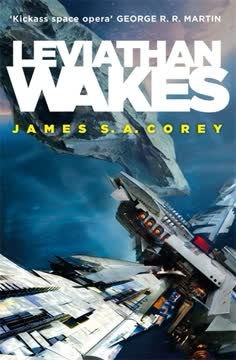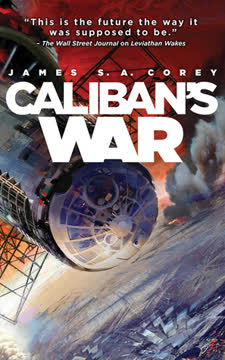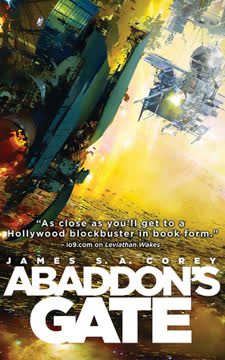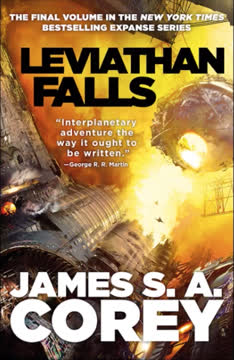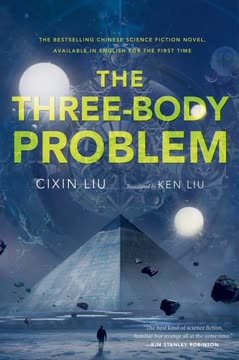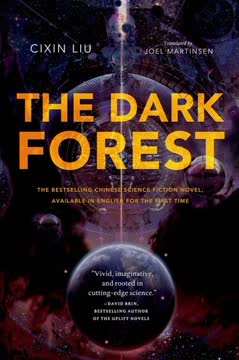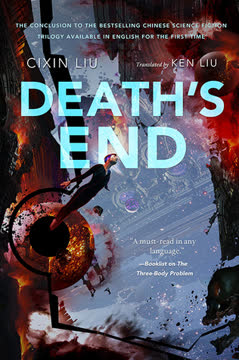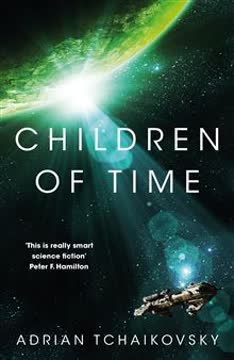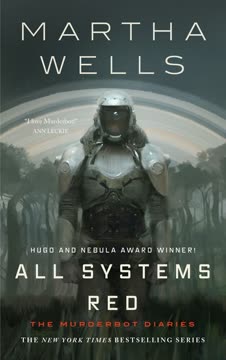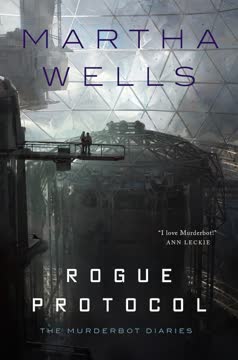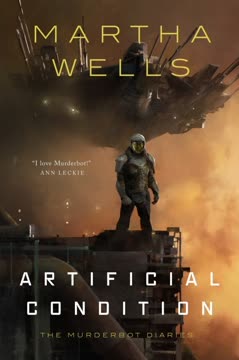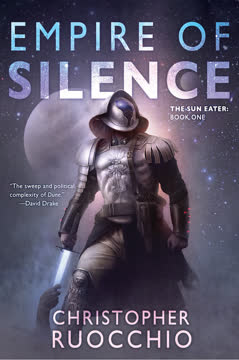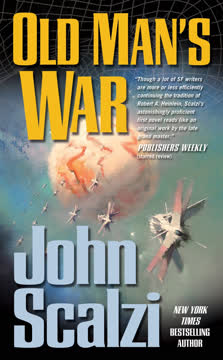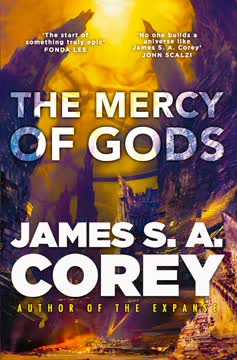Plot Summary
Arrival Sparks Tensions and Violence
James Holden arrives on Ilus to mediate between the colonists and Royal Charter Energy (RCE). His presence, intended to calm tensions, instead ignites them. The colonists, led by Carol Chiwewe, demand recognition of their rights, while RCE's security chief, Murtry, enforces martial law with brutal efficiency. The situation escalates when Murtry shoots a colonist named Coop, claiming self-defense. Holden, caught between the two sides, struggles to maintain peace as both parties prepare for further conflict.
Alien Machines Awaken Unexpectedly
Amidst the human conflict, an ancient alien machine awakens in the desert, drawing the attention of Holden and his team. The machine, a remnant of the civilization that built the protomolecule, begins to move, consuming the local environment. Holden, along with Elvi Okoye, a scientist from RCE, and security officer Chandra Wei, investigate the machine. Despite Holden's warnings, Wei destroys it, fearing the threat it poses. This act raises questions about the potential dangers lurking on Ilus and the unknown consequences of disturbing the alien technology.
Basia's Dilemma and Decision
Basia Merton, a colonist haunted by his past actions, faces a moral crisis. He was involved in the bombing that killed RCE personnel, and now he grapples with the consequences. As tensions rise, Basia is torn between loyalty to his fellow colonists and the desire to protect his family. His daughter, Felcia, plans to leave Ilus for a better future, and Basia must decide whether to support her or keep her close. Ultimately, he chooses to warn Holden about a planned attack on RCE, hoping to prevent further bloodshed and find redemption.
Holden's Authority Challenged
Holden's attempts to mediate are met with resistance from both sides. Murtry dismisses Holden's authority, confident that Holden's reputation as a peacemaker will prevent him from taking decisive action. Meanwhile, the colonists, led by Carol, are skeptical of Holden's intentions, fearing he may side with RCE. Despite these challenges, Holden remains determined to find a peaceful resolution, even as the threat of violence looms over the settlement.
Murtry's Ruthless Control
Murtry's control over the situation becomes increasingly authoritarian. He uses surveillance and intimidation to maintain order, justifying his actions as necessary for the safety of RCE personnel. His tactics include bugging the town and deploying security forces to eliminate perceived threats. Murtry's actions escalate the conflict, pushing the colonists closer to rebellion and forcing Holden to confront the limits of his influence.
Havelock's Dilemma and Decisions
As the situation on the Edward Israel deteriorates, Havelock grapples with the pressure of maintaining order and the moral implications of his actions. The ship's reactor is down, and the crew is on edge, fearing the worst. Havelock's interactions with Naomi Nagata, a prisoner on the ship, reveal his internal conflict. He is torn between his duty to RCE and his growing empathy for Naomi and the colonists. The looming threat of the ship's orbit decaying adds urgency to his decisions. Havelock must navigate the fine line between following orders and doing what he believes is right, all while managing the crew's fear and desperation.
Elvi's Scientific Breakthrough
Amidst the chaos and impending blindness affecting the colonists, Elvi Okoye works tirelessly to understand the alien organism causing the affliction. Her research reveals that James Holden is immune to the organism, providing a glimmer of hope. Elvi's scientific acumen and determination drive her to explore every avenue, despite the personal and professional challenges she faces. Her breakthrough offers a potential path to a cure, but time is running out. The pressure to save the colony weighs heavily on her, as she balances her scientific responsibilities with the emotional turmoil of the situation.
Holden's Desperate Measures
With the colony on the brink of disaster, Holden takes on the burden of leadership. He coordinates efforts to secure supplies and protect the colonists from the deadly environment. The planetary defenses have activated, complicating resupply efforts and threatening the survival of those in orbit. Holden's interactions with Murtry and the colonists highlight his commitment to finding a peaceful resolution, even as tensions rise. His determination to protect his crew and the colonists drives him to make difficult decisions, balancing the immediate needs of survival with the long-term goal of resolving the conflict.
Basia's Redemption and Resolve
Basia Merton, haunted by his past, finds redemption as he helps evacuate the Barbapiccola's crew using makeshift escape pods. His daughter, Felcia, is among those saved, bringing him immense relief. This act of heroism contrasts sharply with his earlier guilt over the deaths caused by his actions. As he watches the Barbapiccola burn up in Ilus' atmosphere, Basia is overwhelmed by the realization of the lives he has saved, finally finding a measure of peace and closure.
Havelock's Loyalty and Leadership
Dimitri Havelock, once a security officer on the Edward Israel, finds himself torn between his duty and his conscience. As he defends the Rocinante from the RCE militia, he grapples with the moral implications of his actions. Despite the chaos, Havelock emerges as a leader, making difficult decisions to protect those around him. His journey reflects the complexities of loyalty and the struggle to do what is right in a lawless frontier.
Elvi's Discovery and Sacrifice
Elvi Okoye, driven by scientific curiosity, discovers the source of the alien threat on Ilus. With the help of Miller, now a construct of the protomolecule, she faces the deadly entity responsible for the planet's dangers. Her bravery and intellect are crucial in disabling the alien technology, saving the colony and the ships in orbit. Elvi's journey highlights the power of knowledge and the sacrifices made in the pursuit of understanding.
Holden's Confrontation and Consequence
James Holden confronts Adolphus Murtry, the ruthless RCE security chief, in a tense standoff. Despite Murtry's justifications for his actions, Holden refuses to let him sabotage the colony's survival. Their confrontation ends with Holden shooting Murtry, capturing him to face justice. This encounter underscores Holden's commitment to protecting his crew and the colony, even at great personal risk.
The Investigator's Final Act
The Investigator, a remnant of the protomolecule's creators, guides Elvi to the heart of the alien threat. In a final act of sacrifice, Miller connects with the entity, shutting down the alien technology and saving the colony. His actions highlight the theme of redemption and the enduring impact of selfless acts. Miller's journey from detective to savior is a poignant reminder of the complexities of identity and purpose.
Avasarala's Strategic Concerns
Chrisjen Avasarala, a shrewd political operator, grapples with the implications of the events on Ilus. As humanity's expansion through the ring gates accelerates, she worries about the destabilizing effects on Mars and the solar system. Avasarala's strategic mind is focused on maintaining balance and preventing conflict, highlighting the challenges of leadership in a rapidly changing universe.
Characters
James Holden
James Holden arrives on Ilus to mediate between the colonists and RCE. Known for his idealism and commitment to transparency, Holden struggles to maintain peace as tensions escalate. His authority is challenged by Murtry's ruthless tactics and the colonists' distrust. Despite these obstacles, Holden remains determined to prevent further violence and uncover the truth about the alien threats on Ilus.
Basia Merton
Basia's journey from guilt-ridden saboteur to hero is marked by his deep love for his family and his desire to atone for past mistakes. His actions to save the Barbapiccola's crew reflect his growth and the power of redemption.
Adolphus Murtry
Murtry is the chief of security for RCE, enforcing martial law on Ilus with brutal efficiency. He dismisses Holden's authority, confident in his ability to control the situation through intimidation and violence. Murtry's actions escalate the conflict, pushing the colonists toward rebellion and challenging Holden's efforts to mediate.
Elvi Okoye
Elvi is an exobiologist with RCE, fascinated by the alien life on Ilus. She accompanies Holden to investigate the awakening of an ancient machine, witnessing the potential dangers of the planet's technology. Elvi's scientific curiosity is tempered by the realization that Ilus holds threats beyond human understanding.
Carol Chiwewe
Carol is the coordinator of the Ilus colony, advocating for the rights of her people against RCE's claims. She is skeptical of Holden's intentions, fearing he may side with the corporation. Carol's leadership is tested as tensions rise, and she must navigate the complexities of the conflict to protect her community.
Chandra Wei
Wei is a member of RCE's security team, fiercely loyal to Murtry and willing to take decisive action to protect her colleagues. She accompanies Holden to investigate the alien machine, ultimately destroying it out of fear. Wei's actions reflect the growing tension between RCE and the colonists, as well as the potential dangers of Ilus.
Dimitri Havelock
Havelock's internal struggle between duty and morality leads him to question his role in the conflict. His leadership and loyalty to his crew highlight the complexities of authority and the importance of conscience.
The Investigator (Miller)
The Investigator, a construct of the protomolecule, guides Elvi to the heart of the alien threat. His final act of sacrifice underscores themes of redemption and the enduring impact of selfless acts.
Chrisjen Avasarala
Avasarala's political acumen is tested as she navigates the implications of humanity's expansion through the ring gates. Her focus on maintaining balance and preventing conflict highlights the challenges of leadership in a changing universe.
Plot Devices
Alien Technology Awakening
The awakening of an alien machine on Ilus serves as a catalyst for the unfolding events. This plot device highlights the potential dangers of the planet's ancient technology and raises questions about the intentions of the civilization that created it. The machine's activation forces the characters to confront the unknown threats lurking on Ilus, adding urgency to the need for evacuation.
Human Conflict and Mediation
The conflict between the colonists and RCE is central to the narrative, with Holden caught in the middle as a mediator. This plot device explores themes of power, authority, and the challenges of maintaining peace in a volatile situation. The human conflict is juxtaposed with the larger, unseen threats of Ilus, emphasizing the complexity of the characters' struggles.
Moral Dilemmas and Redemption
The story is driven by the characters' moral dilemmas, particularly Basia's struggle for redemption. This plot device adds depth to the narrative, as characters must navigate their personal conflicts while dealing with the larger issues on Ilus. The theme of redemption is woven throughout the story, highlighting the potential for growth and change even in the face of adversity.
Alien Technology Shutdown
The shutdown of the alien technology on Ilus is a pivotal moment, saving the colony and the ships in orbit. This plot device underscores the themes of sacrifice and the power of knowledge in overcoming seemingly insurmountable challenges.
Analysis
"Cibola Burn" by James S.A. Corey delves into the complexities of human nature, power dynamics, and the quest for redemption. The narrative explores the tension between colonists and corporate interests, highlighting the challenges of leadership and the moral dilemmas faced by individuals in positions of authority. The awakening of alien technology serves as a metaphor for the unknown dangers of exploration and the consequences of human ambition. Through characters like Basia and Miller, the story emphasizes the potential for personal growth and redemption, even amidst chaos and conflict. The book ultimately underscores the importance of empathy, understanding, and the pursuit of knowledge in navigating a rapidly changing universe.
Last updated:
FAQ
Synopsis & Basic Details
What is Cibola Burn about?
- Colonial Conflict Ignites: Cibola Burn plunges humanity into a violent clash on Ilus (also known as New Terra), the first habitable exoplanet discovered through the Ring Gates. Belter refugees, who illegally settled the planet, face off against Royal Charter Energy (RCE), a corporation with a UN charter for scientific exploration and mining rights.
- Holden's Mediation Mission: James Holden and the crew of the Rocinante arrive as UN/OPA mediators, tasked with de-escalating the escalating tensions. However, the situation quickly devolves into open warfare between the desperate colonists and RCE's ruthless security chief, Adolphus Murtry.
- Alien Threat Awakens: Beneath the human conflict, ancient alien technology on Ilus begins to stir, posing an existential threat to everyone on the planet and in orbit. The story follows multiple perspectives—Holden, colonist Basia Merton, RCE scientist Elvi Okoye, and RCE security officer Havelock—as they navigate survival, moral dilemmas, and the terrifying secrets of a long-dead alien civilization.
Why should I read Cibola Burn?
- Deep Dive into Human Nature: The novel masterfully explores the raw, often ugly, facets of human nature when resources are scarce and survival is paramount, contrasting idealism with brutal pragmatism. It forces readers to question who the "good guys" and "bad guys" truly are in a morally ambiguous frontier.
- Thrilling Sci-Fi Mystery: Beyond the human drama, Cibola Burn offers a compelling alien mystery, unraveling the secrets of the protomolecule builders and the catastrophic event that wiped them out. The awakening alien technology introduces a terrifying, unpredictable element that elevates the stakes beyond mere human squabbles.
- Character-Driven Narrative: With multiple, distinct viewpoints, the book provides rich psychological depth, allowing readers to intimately experience the characters' fears, motivations, and transformations. The personal stakes are incredibly high, making their struggles and triumphs deeply resonant.
What is the background of Cibola Burn?
- Post-Ring Gate Expansion: The story is set after the opening of the Ring Gates, which provided access to a thousand new star systems. This event fundamentally reshaped human civilization, creating new opportunities for expansion but also unprecedented geopolitical instability and resource conflicts.
- Belter Refugee Crisis: The Belter colonists on Ilus are refugees from Ganymede, displaced by previous conflicts and seeking a new home free from inner-planet control. Their illegal settlement of Ilus is a direct consequence of the solar system's ongoing social and political tensions, highlighting themes of displacement and self-determination.
- Ancient Alien Legacy: Ilus is a planet heavily modified by the protomolecule's creators, filled with dormant but powerful alien technology. This ancient infrastructure, including a planetary defense grid and a vast material transfer network, becomes a central element of the plot, revealing the immense power and unknown dangers of the vanished civilization.
What are the most memorable quotes in Cibola Burn?
- "It was astounding, Bobbie thought, how quickly humanity could go from What unimaginable intelligence fashioned these soul-wrenching wonders? to Well, since they're not here, can I have their stuff?" (Prologue, Bobbie Draper): This quote perfectly encapsulates humanity's opportunistic and often rapacious nature when confronted with new frontiers, setting a cynical tone for the resource conflicts that define the novel. It highlights the immediate shift from awe to exploitation, a core theme of colonization.
- "The frontier always outpaces the law." (Chapter 14, James Holden): Holden's observation to Miller reflects the central conflict of the novel—the struggle to establish order and justice in a new, lawless environment. It underscores the inherent difficulty of mediation when established rules and authorities are distant or irrelevant, forcing characters to confront raw power dynamics.
- "Choosing to stand by while people kill each other is also an action." (Chapter 21, Naomi Nagata): Naomi's powerful statement to Basia Merton defines the moral imperative that drives the Rocinante crew. It rejects passive neutrality in the face of injustice, emphasizing that inaction has consequences and that true mediation often requires decisive intervention, even if it means breaking traditional rules.
What writing style, narrative choices, and literary techniques does James S.A. Corey use?
- Multi-Perspective Narrative: Corey employs a tight third-person limited perspective, rotating between four main characters (Holden, Basia, Elvi, Havelock) and incorporating "The Investigator" interludes. This allows for a comprehensive, yet intimate, understanding of the complex conflict, revealing diverse motivations and emotional states.
- Gritty Realism and Hard Sci-Fi: The authors maintain a grounded, realistic approach to space travel, physics, and technology, even when dealing with alien phenomena. The descriptions of gravity, ship mechanics, and environmental hazards are meticulously detailed, lending credibility to the fantastical elements.
- Foreshadowing and Thematic Echoes: Subtle hints and recurring motifs (like the "dead spot," the nature of alien life, and the cyclical nature of conflict) are woven throughout the narrative. This builds suspense and reinforces deeper themes, such as humanity's tendency to repeat past mistakes and the unpredictable consequences of disturbing ancient powers.
Hidden Details & Subtle Connections
What are some minor details that add significant meaning?
- Mimic Lizards' Echoes: The mimic lizards on Ilus, which imitate sounds, subtly reflect the human conflict. Basia's initial encounter with one that grunts back at him (Chapter 1) foreshadows how the colonists and RCE mirror each other's aggression and fears, echoing each other's violence rather than finding unique solutions.
- Havelock's "Pied Piper" Memory: Havelock's fleeting thought of a "lame child and the Pied Piper" (Chapter 10) as his RCE colleagues depart for the planet is a subtle but potent foreshadowing of his own eventual moral defection. It hints at his feeling of being left behind or led astray by a charismatic but dangerous leader (Murtry), much like the children in the fable.
- Ilus's "Machined" Geology: Fayez's geological observations that Ilus's lithium deposits and flat plains are "machined" and "not natural" (Chapter 8) are crucial. This detail elevates the alien threat from mere biological contamination to a planet-wide, engineered system, implying a deeper, more deliberate alien presence and purpose than initially understood.
What are some subtle foreshadowing and callbacks?
- Miller's "Croatoan" Reference: Miller's comparison of Ilus to "Croatoan shit" (Chapter 14) is a chilling callback to the lost Roanoke colony, subtly foreshadowing the complete disappearance of the protomolecule builders and the potential for humanity to suffer a similar fate if they don't understand the alien threat. It hints at a mystery of vanished inhabitants, not just ruins.
- Naomi's "Old Dog" Comment: Naomi pulling a gray hair from Holden's temple and calling him an "old dog" (Chapter 7) subtly foreshadows the immense emotional and physical toll the events on Ilus will take on him, aging him beyond his years. It also hints at his ingrained patterns of behavior, suggesting he's set in his ways despite his desire for change.
- The Investigator's "Doors and Corners": The Investigator's recurring internal mantra, "Doors and corners. This could get ugly, kid" (Interlude 11), is a direct callback to Miller's advice to Holden in Leviathan Wakes. Here, it's applied to the alien network itself, foreshadowing the complex, dangerous, and often hidden pathways within the protomolecule's systems that Holden will eventually have to navigate.
What are some unexpected character connections?
- Havelock and Miller's Shared Past: The revelation that Havelock was Miller's partner on Ceres (Chapter 26) creates an unexpected, deep connection. This shared history explains Havelock's nuanced understanding of Belter psychology and his eventual moral shift, as he implicitly carries Miller's pragmatic, yet ultimately ethical, influence.
- Elvi's Nigerian Heritage and Holden's Family: Elvi's mention of growing up in Nigeria and Holden's revelation of having family there (Chapter 16) creates a surprising, almost familial, connection between them. This subtle detail humanizes both characters and hints at the vast, interconnected web of humanity, even across light-years and cultural divides.
- Amos and Wei's Mutual Respect: Despite being on opposing sides, Amos and Chandra Wei develop a surprising, unspoken respect, even flirtation, during their interactions (Chapter 38). Their shared understanding of violence and pragmatism transcends their allegiances, highlighting how common ground can be found in unexpected places, even among "killers."
Who are the most significant supporting characters?
- Fayez Sarkis: Elvi's colleague, Fayez, initially serves as comic relief and a cynical foil, but his growing fear and eventual willingness to join the dangerous expedition with Amos and Elvi (Chapter 46) reveal his underlying courage and loyalty. He represents the scientific community's struggle to cope with overwhelming, non-academic threats.
- Lucia Merton: Basia's wife, Lucia, is the moral compass of the colonist community and a skilled doctor. Her unwavering commitment to healing, even her enemies, and her fierce protection of her children (Chapter 12, 21) highlight the enduring power of compassion and family amidst chaos, contrasting sharply with the political machinations.
- Carol Chiwewe: The pragmatic and resilient colony coordinator, Carol, embodies the colonists' struggle for self-determination. Her constant efforts to organize, negotiate, and protect her people (Chapter 14, 31) showcase the immense burden of leadership in a desperate situation, often forcing her to make impossible choices.
Psychological, Emotional, & Relational Analysis
What are some unspoken motivations of the characters?
- Basia's Atonement for Katoa: Basia's relentless drive to secure Ilus for his family, even resorting to violence, is deeply rooted in his unspoken guilt over leaving his son, Katoa, to die on Ganymede (Chapter 1, 5). His desire for a "home" is less about land and more about creating a sanctuary where he can never again fail to protect his children, a desperate attempt at atonement.
- Murtry's Legacy of Control: Adolphus Murtry's ruthless pragmatism and insistence on RCE's claims, even in the face of planetary destruction, are driven by a profound belief in the necessity of order and control in the frontier (Chapter 48, 53). His motivation isn't just corporate profit, but a desire to impose a "civilized" structure, seeing himself as a modern-day Cortez, building a new world through force and sacrifice.
- Elvi's Scientific Obsession as Coping: Elvi's intense focus on exobiology, even amidst personal danger and emotional turmoil, serves as a psychological coping mechanism. Her drive to understand the alien ecosystem (Chapter 13, 27) allows her to compartmentalize fear and grief, finding solace and purpose in intellectual pursuit when human relationships and safety are crumbling.
What psychological complexities do the characters exhibit?
- Holden's White Knight Burden: Holden grapples with the immense psychological burden of his "white knight" reputation, feeling compelled to save everyone while recognizing the futility of his efforts (Chapter 18, 29). His internal conflict between his idealistic desire for peace and the brutal realities of the frontier leads to exhaustion and self-doubt, making him question his own effectiveness and sanity.
- Havelock's Disillusioned Pragmatism: Havelock's journey from loyal RCE security to reluctant mutineer reveals a complex psychological shift, driven by disillusionment with Murtry's cruelty and a growing empathy for the innocent (Chapter 36, 40). He struggles with the moral compromises of his profession, ultimately choosing a path of active resistance based on a pragmatic assessment of survival and a rediscovered sense of personal ethics.
- Basia's Cycle of Violence and Guilt: Basia exhibits a cyclical pattern of violence driven by past trauma, followed by profound guilt and a desperate search for redemption (Chapter 9, 51). His actions are often impulsive and emotionally charged, reflecting the deep-seated pain of his losses and his struggle to break free from a destructive cycle, culminating in a moment of profound self-realization.
What are the major emotional turning points?
- Basia's Confession to Holden: Basia's decision to warn Holden about the planned attack, confessing his involvement in past violence (Chapter 17), is a pivotal emotional turning point. It marks his conscious break from Coop's extremist faction and a desperate plea for a different path, driven by his love for his family and a nascent desire for redemption.
- Elvi's Breakdown and Breakthrough: Elvi's emotional breakdown, confessing her "love" for Holden (Chapter 35), is a raw moment of vulnerability that immediately precedes her scientific breakthrough regarding the blindness cure. This juxtaposition highlights how extreme stress can lead to both emotional unraveling and profound intellectual insight, revealing her deep-seated loneliness and fear.
- Havelock's Mutiny and Naomi's Rescue: Havelock's decision to release Naomi and actively resist his own RCE security team (Chapter 42) is a dramatic emotional turning point. It signifies his complete rejection of Murtry's ideology and his embrace of a more humane, if dangerous, path, driven by a sense of shared humanity and a refusal to participate in senseless death.
How do relationship dynamics evolve?
- Holden and Naomi: Strain and Reaffirmation: The long-distance separation and the pressures of their respective roles (Holden mediating, Naomi imprisoned) strain their relationship, highlighting their individual burdens. However, Naomi's eventual rescue and their reunion (Chapter 43, 56) reaffirm their deep bond and mutual reliance, emphasizing their strength as a couple.
- Basia and Lucia: Fractured Trust to Resilient Love: Basia's involvement in the initial violence severely fractures Lucia's trust, leading to strained communication and emotional distance (Chapter 5, 12). Yet, her unwavering support for their children and Basia's eventual acts of redemption begin to mend their relationship, showcasing a resilient love that endures even profound betrayal.
- Amos and Holden: Unspoken Loyalty and Pragmatic Partnership: Amos's loyalty to Holden deepens, evolving into an almost paternal protectiveness, especially when Holden is vulnerable (Chapter 23, 44). Their relationship is characterized by unspoken understanding and a pragmatic approach to violence, where Amos acts as Holden's brutal enforcer, allowing Holden to maintain his moral high ground.
Interpretation & Debate
Which parts of the story remain ambiguous or open-ended?
- The Protomolecule Masters' True Fate: While Miller suggests the protomolecule masters were wiped out by an unknown entity, the exact nature of this "dead spot" and the full scope of their demise remain ambiguous (Interlude 34, 44). The story leaves open the possibility of a lingering, unseen threat or a cyclical cosmic event that could recur.
- Ilus's Long-Term Viability: Despite the immediate crisis being averted, the long-term viability of human settlement on Ilus remains uncertain. The planet's extreme geological instability, the presence of deadly indigenous life, and the lingering effects of the alien defense grid (Chapter 55) suggest that humanity's future on Ilus is far from guaranteed, leaving its ultimate fate open to interpretation.
- The Investigator's Ultimate Purpose: While Miller's construct sacrifices itself to shut down the alien network, its true nature and whether it achieved its "purpose" are left somewhat open. The final interlude (Interlude 54) suggests a broader, almost cosmic awareness, implying that its "death" might be a transformation or integration into a larger system, rather than a definitive end.
What are some debatable, controversial scenes or moments in Cibola Burn?
- Murtry's Execution of Coop: Murtry's cold-blooded shooting of Coop in front of Holden and the colonists (Chapter 11) is highly controversial. While Murtry justifies it as a response to a direct threat and an assertion of martial law, it immediately escalates the conflict and undermines Holden's mediation, sparking debate about the ethics of pre-emptive violence and the definition of self-defense in a lawless environment.
- Holden's Decision to Shoot Murtry: Holden's choice to shoot Murtry (Chapter 53), rather than simply disarming or capturing him, is a significant departure from his usual non-lethal approach. This moment challenges his "white knight" persona and sparks debate about whether his actions were justified by Murtry's continued aggression and the immediate threat to his crew, or if he succumbed to personal revenge.
- The Ethics of Colonization on Ilus: The entire premise of the human conflict on Ilus is debatable: who has the right to a new world? The Belters, as first settlers, or RCE, with a UN charter? The novel forces readers to confront the historical parallels of colonialism and question whether humanity is doomed to repeat patterns of exploitation and conflict on new frontiers.
Cibola Burn Ending Explained: How It Ends & What It Means
- Alien Threat Neutralized, Human Conflict Persists: The novel concludes with Elvi Okoye, guided by the Investigator (Miller), successfully disabling the alien defense network, restoring fusion power to the ships in orbit and allowing for resupply and evacuation. This averts immediate planetary catastrophe. However, the human conflict isn't fully resolved; Murtry is captured by Holden to face trial, but the underlying tensions between colonists and corporate interests remain, setting the stage for future geopolitical struggles.
- The Cost of Survival and Moral Compromises: The ending emphasizes the heavy cost of survival. Basia Merton finds a measure of redemption by helping save the Barbapiccola's crew, but he grapples with the guilt of his past actions. Havelock abandons his corporate loyalty to aid the Rocinante, highlighting the moral compromises forced by extreme circumstances. The Barbapiccola is lost, and many lives are sacrificed, underscoring that victory often comes with profound losses.
- A New, Unstable Frontier: The Rocinante crew, along with the surviving RCE personnel and colonists, eventually leave Ilus, but the planet is not abandoned. A new, mixed community begins to rebuild, led by Carol Chiwewe and Sudyam. The epilogue with Avasarala reveals the broader geopolitical implications: Ilus has become a precedent for rapid, uncontrolled human expansion through the Ring Gates, threatening the stability of Mars and the entire solar system. The "thousand worlds" represent both boundless opportunity and unprecedented danger, ensuring that humanity's future will be defined by continuous, complex conflicts.
Review Summary
Cibola Burn receives mixed reviews, with many praising its exploration of a new frontier and the continued development of beloved characters. Some readers find it slower-paced than previous entries, while others appreciate the focus on human conflicts in a new world. The novel's examination of colonization, politics, and alien technology is lauded, though some criticize certain character arcs and plot elements. Overall, fans of The Expanse series generally enjoy this installment, even if some consider it weaker than its predecessors.
The Expanse (Chronological) Series
Similar Books
Download PDF
Download EPUB
.epub digital book format is ideal for reading ebooks on phones, tablets, and e-readers.

